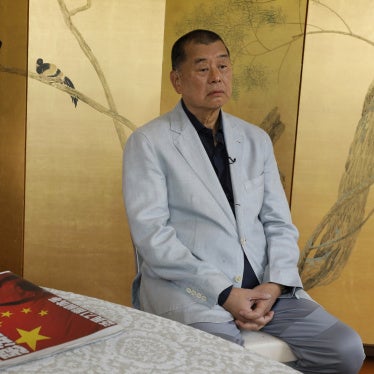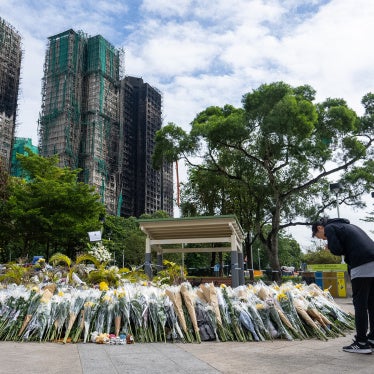(New York) -- The Chinese government's new interpretation of the Basic Law pushes back the day when Hong Kong people will be able to exercise their right to choose their political leaders, Human Rights Watch said today. The decision means that electoral reforms can only be initiated by Beijing's hand-picked Chief Executive, and bars Hong Kong's legislature from taking any action without his approval.
The 1984 "Joint Declaration" between China and the United Kingdom, which established the terms of the transfer of Hong Kong sovereignty from Britain to China, and the Beijing-promulgated Basic Law guarantee Hong Kong people "a high degree of autonomy" and basic human rights. Recent opinion polls in Hong Kong have shown large majorities in favor of direct elections and greater democracy.
"The Basic Law created the possibility and even the expectation of a fully elected legislature and a directly elected executive," said Brad Adams, executive director of Human Rights Watch's Asia division. "Issuing this interpretation was a transparent attempt to stifle public debate about greater democracy. Beijing's disinterest in what people in Hong Kong think or want couldn't be more apparent."
The new interpretation suggests that Beijing's goal is to preserve the status quo. At present, a majority of seats in Hong Kong's Legislative Council (LegCo) are elected by narrowly defined professional groups, while the Chief Executive is chosen by an election committee under the effective control of Beijing. Continuing with the current system would ignore the provisions in the Basic Law annexes that allow for amendments to Hong Kong's election system after 2007 and the obligation in Articles 45 and 68 of the Basic Law to move toward universal suffrage for the election of the Chief Executive and LegCo.
Beijing's move directly contradicts previous assurances by Chief Tung Chee-Hwa. During a visit to the United States in September 1997, Tung said that the Basic Law "says very clearly that at the end of that time we are going to move into universal suffrage if it is at that time the wish of the Hong Kong people." Tung went on to say that although the Basic Law can be amended to accelerate the process, "We got it about right, a 10-year process going forward, and looking at ultimately universal suffrage."
"This looks like China and Tung have played a game of bait and switch with the Hong Kong people, suggesting an openness to more democratization just after the handover in 1997 but now making it clear that it is not in the offing," said Adams. "This interpretation contradicts both the spirit of the Basic Law and the expectations of Hong Kong people," said Adams.
Under Article 25 of the International Covenant on Civil and Political Rights, all individuals have the right to "vote and be elected at genuine periodic elections which shall be by universal and equal suffrage." The Human Rights Committee has called on states to protect the right to participate in elections by "adopt(ing) such legislative and other measures as may be necessary to ensure that citizens have an effective opportunity to enjoy the rights (Article 25) protects." The Committee has also stated that "Article 25 lies at the core of democratic government based on the consent of the people and in conformity with the principles of the Covenant."
Human Rights Watch also faulted the Chinese government for an interpretation that went well beyond the scope of the Basic Law itself. While Article 158 allows the Standing Committee of the National People's Congress, China's highest legislative body, to issue interpretations of Basic Law provisions, those interpretations should be limited to resolving textual ambiguities, and should be issued only in conformity with Beijing's obligation under the Basic Law to preserve Hong Kong's autonomy and its common law system.
"Because the interpretation issued today increases Beijing's power by adding procedural requirements not found in the Basic Law, it is essentially an amendment to the Basic Law," said Adams. "China has no right to do this."
Under Article 159 of the Basic Law, all amendments must be approved by a 2/3 vote of the Hong Kong LegCo, and no amendment may "contravene the established basic policies of the People's Republic of China regarding Hong Kong," including those related to human rights.
"The Basic Law contains key protections for the people of Hong Kong," said Adams. "If Beijing can change Basic Law provisions relating to elections, then what's to stop it from going after other parts of the Basic Law that protect other basic human rights?"
The interpretation by the Standing Committee added a new procedural requirement in order to democratize Hong Kong's electoral system. Under Beijing's interpretation, LegCo is barred from initiating a reform of the election law. Instead, the reform process can only be initiated by the Chief Executive, who is effectively appointed by Beijing. The Standing Committee must then approve any reform proposals initiated by the Chief Executive before the Legislative Council can weigh in.
These requirements are not found in the text of the Basic Law. Despite repeated calls by pro-democracy groups and political parties in Hong Kong to engage in an open and consultative process before issuing an interpretation, the central government refused to engage in any dialogue with the people of Hong Kong.








